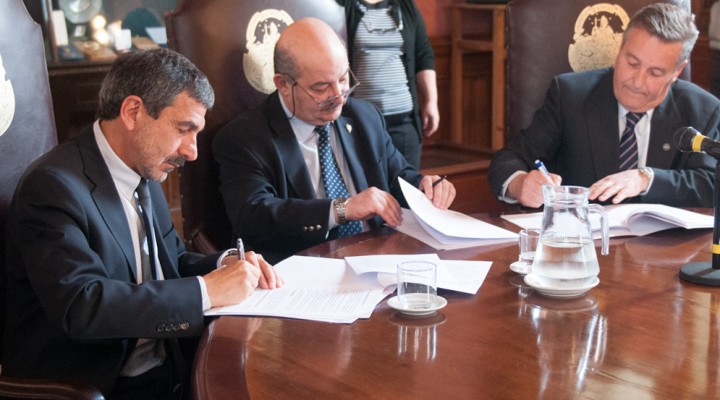Institutional Bonds
The CONICET signed an agreement with the CICPBA, the UNLP and the UNCPBA
The agreements will strengthen scientific cooperation bonds, knowledge transference and training of human resources between the institutions.
The president of the National Scientific and Technical Research Council (CONICET), Dr. Roberto Salvarezza, and the deputy chairman of the Universidad Nacional de La Plata (UNLP), Dr. Fernando Tauber; and the highest authority of the Comisión de Investigaciones Científicas de la Provincia de Buenos Aires (CICPBA), Eng. José María Rodríguez Silveira; signed an agreement to strengthen promotion actions and the implementation of scientific and technological research tasks, the transference of the results to the socio-productive sector and the training of human resources.
The agreement also acknowledges three former double dependency institutions as Triple Dependency Implementation Units. These institutions are the Centro de Investigaciones Ópticas (CIOP), the Instituto Multidisciplinario de Biología Celular (IMBICE) – under the scope of the CONICET and the CIC-, and the Centro de Investigación y Desarrollo en Criotecnología de Alimentos (CIDCA) – under the UNLP and the CONICET-.
For Dr. Salvarezza, “Today, we all advance because there has been one political measure to consider science and technology as important aspects for the country and due to the fact that there has been trust between people. When people talk about the CONICET, they refer to the Council and the university as 90% of the 10.000 researchers that we have in 2016 are university professors.”
He also said that “with the CIC and the UNLP we coincide with the objective, which is to have science and technology to serve the development of the country. Researchers do quality science that can be used. We welcome the provinces that interact with the institutes, CCTs and local universities; we need to saw the seeds of regional and national growth.”
For his part, Tauber said that “the CONICET and the CIC are two valuable institutions for public universities and Argentine science. The signature of this agreement is a milestone and reflects a strategic perspective of how to produce more efficient tools to generate national knowledge.”
Furthermore, he also added that these two organizations “have a great responsibility regarding the consolidation of autonomous policies linked to progress and equality. Some of the great coincidences we had were: to promote research for development, convergence between the scientific and social agenda, and knowledge production for the society.”
Rodríguez Silveira finally said that for the CIC, it is important “to formalize the agreement by which these institutions are going to be considered as triple dependency centres. This was possible thanks to the excellent administrations of both organizations. This union will be vital for the development of productive sectors of the province.”
The president of the Council then signed a similar agreement with the president of the CICPBA and the vice-chancellor of the Universidad Nacional del Centro de la provincia de Buenos Aires (UNCPBA), Roberto M. Tassara.
Rodríguez Silveira added: “The CIC has worked for many years with the UNCPBA and the CONICET, and we are going to sign an agreement through which two implementation units are going to become triple dependency centres.” We refer to the Centro de Investigación Veterinaria de Tandil (CIVETAN) and the Centro de Investigaciones en Física e Ingeniería del Centro de la Provincia de Buenos Aires (CIFICEN).
For Salvarezza, “this is another opportunity to show the bonds with the institutions. The Council is a federal organization that needs to have bonds with local institutions and the provinces to define subjects and needs. This signature formalizes the collaborative work of the institutions.”
Besides, Tassara stated that “the triple dependency is an administration, coordination, and bond challenge. This is possible within the context of a country that has reconsidered the value of its scientists. We expect to have continuity for this type of policy that promotes the strategic development of the country.”
Furthermore, the president of the Council and the CICPBA signed an agreement for the call, identification, management and joint funding of Proyectos de Investigación Orientados (PIO). For the implementation of the selected projects, a sum of ARS$ 6.000.000 will be provided in two years. This sum will by formed by ARS$ 4.500.000 as part of the contribution of the CONICET, and ARS$ 1.500.000 given by the CICPBA.
The lines of research the members agreed on are: innovations for added value in agro-industrial chains of the province of Buenos Aires; renewable energies; urban and industrial waste; research on public policies to promote the development of productive innovations and transference processes with a clear objective for the production of autonomous actions on resources, processes and material and symbolic products; the use of Tecnologías de la Información y la Comunicación (TICs) [Information and Communication Technologies] to enhance the security; infrastructure and regional development; preservation of coastal environments, hydrogeology, groundwater and water management; materials for productive uses; social problems.
The signature was atended by: Eng. Carlos Gianella, undersecretary of Science and Technology of the Ministry of Production, Science and Technology of the province of Buenos Aires; the director and deputy director of the Scientific and Technological Centre of CONICET La Plata, Dr. Dr. Luis Epele and Dra. Pilar Peral García, respectively; the Scientific and Technological Development manager of the Council, Jorge Tezon; the director of Development and Management of Divisional Units, Luisa Baigorria; and the director of Agreements and Projects, Patricia Maccagno.
